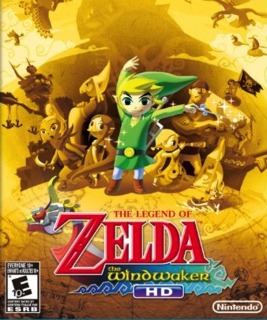Princess saving on the open seas.
Opening with a retelling of Ocarina of Time's events (now as an ancient legend), Wind Waker takes place in a time period after Hyrule was destroyed by some sort of disaster. The newest incarnation of series protagonist Link is celebrating his birthday when his sister is kidnapped by a strange bird-like creature that finds his way to the island. Striking a deal with local pirates, Link sets off to find his sister and soon finds himself on an adventure to determine the fate of his world and people. More ambitious than its predecessors, Wind Waker succeeds in finally making the player care for Link as a character rather than an interactive device to advance the plot. You genuinely find yourself striving to make Link succeed, both because he is a character that you care for and you genuinely want to know what twists and turns that the story will take next.
The wonderful visuals of the game lend themselves to the story as well. Character models are simple but subtly detailed to make every citizen, friend, and enemy met in the game unique. Most notably are Link's reactions to what is happening on screen. Gone is the blank-staring hero of old to be replaced with an inquisitive little guy not afraid to show when he's happy, sad, angry, frustrated, or even confused without the use of words. The look of the entire world looks like something out of a stylized animated movie with greatly scaled draw distances between lands with no pop-up and topnotch animation that flows effortlessly from frame to frame. The artistry of Wind Waker is simply a beautiful thing to look at, whether still or in motion.
Wind Waker's musical score also fails to disappoint. Although clearly inspired older tunes of the series, this adventure on the high seas isn't afraid to mix things up, remixing old classics well and providing new melodies that enhance the feeling of being out on an epic adventure.
As amazing as the games production values are however, they would all amount to nothing if the game were unplayable. Yet even in the category of playability, The Legend of Zelda refuses to be anything less than an example of how to create a quality video game. Borrowing the controls scheme used in previous critical darling, "The Legend of Zelda: Ocarina of Time", Wind Waker has the fortunate advantage of being played with a GameCube control pad, making the button layout easy to maneuver the fingers around. This enhances the precision of the controls and allows for more sophisticated tasks such as combat combos and ship combat at sea. The dungeons still offer a decent challenge to problem solving in their design and are concluded by breathtaking, if not slightly formulaic boss battles. And then there's the sailing, the most bittersweet aspect of the whole game. While it gives the world an amazing scale and looks positively majestic while the theme of the Great Sea playing in the background, it's frequency in the game does start to lead to repetition, especially when changing wind direction requires you to come to a complete stop. It's hard to see how such a mechanic could have been executed in any other way but it is a shame that this could not have been avoided. Despite being more of a nitpick rather than a design flaw, it does nag at the back of one's head quite a bit.
As a whole, The Legend of Zelda: Wind Waker is spectacular from beginning to end. It is one of the best games I have played in 2003 and one of the best that I have ever played in my life period. Going in with a healthy amount of skepticism, it enthralled me from the moment I pressed the power button and never released me from its grip.

